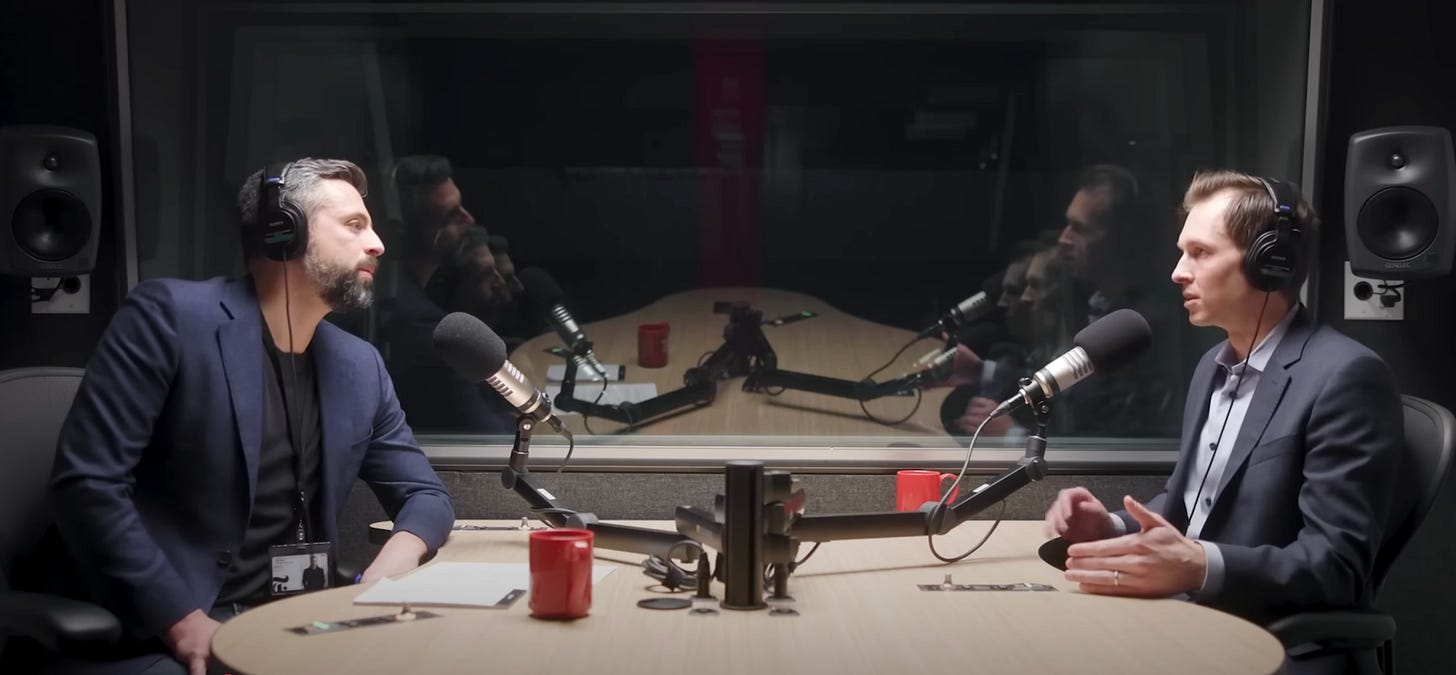How not to talk about politics
Wonk policy discourse revels in its own arbitrary complexity while eliding fundamental political and ideological questions
By way of Chapo Trap House, I learned of a recent conversation between Ezra Klein and a Congressman from Massachusetts published in the New York Times under the headline “A Democrat Who Is Thinking Differently.” (If you want to dig in for yourself, I highly recommend listening to the Chapo discussion rather than trying to read it word for word. Rarely in my life have I ever consumed such a potent soporific, at least in prose form.)
The Congressman in question, one Jake Auchincloss, is just the latest example of a kind of politician we’re periodically introduced to via pieces like this. Making clear he doesn’t agree with everything his interlocutor says, here’s how Klein frames the discussion.
Democrats are in the opposition now — that means fighting the worst of what Trump is doing. But it also means providing an alternative, creating another center of gravity in American politics. So one thing I’m going to do on the show this year is talk to Democrats who sound like they are trying to find that alternative — crafting an agenda that is alive to this moment, not just one carried over from the past. Among the Democrats talking about the abundance agenda, he has had particularly interesting things to say.
From the outset, Auchinsloss is thus presented to us as someone thinking in new and interesting ways, both about public policy and the future of the Democratic Party. Pretty much from the get-go — note Klein’s reference to something called the “abundance agenda”, which we’ll return to below — there are some telltale signs that we’re dealing with something far more generic.
The funny thing is that Auchinsloss begins by making a number of points that are perfectly reasonable and might even be precursors to insight. He hails from a once solidly blue district whose biggest city went for Trump in November and laments that the GOP has made headway when it comes to building the kind of multiethnic working class coalition that used to form the Democrats’ electoral firewall.
Auchinsloss says many things that on the face of it seem very complicated. He deals in concepts that sound both incredibly sweeping and exhaustingly granular. In Tom Friedmanesque fashion, many of these turn out to have smaller concepts contained inside of them, the anecdotes and metaphors unpacking themselves like verbal Matryoshka dolls stuffed with ever-tinier quantities of nonsense.
Though he can’t resist market-speak — “my view…is that voters who ordered a Coca-Cola don’t want a Diet Coke” — he also makes a sensible argument about the salience of cultural issues in elections and seems to suggest Democrats should give up the game of trying to outflank the right: “If you’re walking to the polls and your No. 1 issue is guns, immigration or trans participation in sports, you’re probably not going to be a Democratic voter.”
Taken on its own, this is a welcome enough sentiment from a liberal Congressman. The Democratic effort to capture affluent Republican voters by talking up their love of guns or pandering to anti-trans paranoia hasn’t succeeded even on its own very narrow terms and (if you’re reading him generously at least) Auchinsloss seems poised to mount the case for a more populist and majoritarian kind of politics that foregrounds material concerns. It’s at precisely this moment, however, that his spiel starts to morph inexorably into bog-standard centrist boilerplate. “The core Democratic economic message,” he says, “is that taxes plus housing plus health care is less than half your wallet. That is our economic telos. And that requires treating cost disease where it afflicts sectors across the United States economy — most notably housing and health care.”
It’s all well and good to emphasize housing and healthcare, and a policy agenda that aspires to reduce the financial burden imposed by essential costs sounds perfectly fine in the abstract. The real question is what any of this actually means and, from here on out much of the discussion becomes utterly impenetrable for the casual reader not versed in the esoteric nomenclature of its wonk interlocutors.
Auchinsloss says many things that on the face of it seem very complicated. He deals in concepts that sound both incredibly sweeping and exhaustingly granular. In Tom Friedmanesque fashion, many of these turn out to have smaller concepts contained inside of them, his anecdotes and metaphors unpacking themselves like verbal Matryoshka dolls stuffed with ever-tinier quantities of nonsense.
In the span of just a few sentences, we thus go from a definition of “cost disease” as it relates to healthcare and the housing market — illustrated by way of references to haircuts and the assembling of cars — to some generic pablum about the need to invest in biotechnology and medical devices, which are in turn defined as “those…things that turn a service — which is all the people at a hospital who perform services to care for people — into a product.”
There are thousands upon thousands more words in the same vein, touching variously on blockchain technology (Auchinsloss is for it); healthcare (he’s a fan of the private kind, wanting to fund community health clinics but go no further for reasons that are neither coherent nor really even discernible); education (“What if we made the commitment that every single kid is going to get in-depth one-on-one tutoring, both A.I. and also teacher delivered — and we just flipped the script entirely on what it means to have education?”); the absolutely inscrutable idea of an “attention tax” that funds local journalism; housing (he thinks there needs to be “an economy of Legos rather than Monopoly”); markets and free enterprise (he is also a fan, but is against both excessive government bureaucracy and corporate capture).
Keep reading with a 7-day free trial
Subscribe to Luke Savage to keep reading this post and get 7 days of free access to the full post archives.





